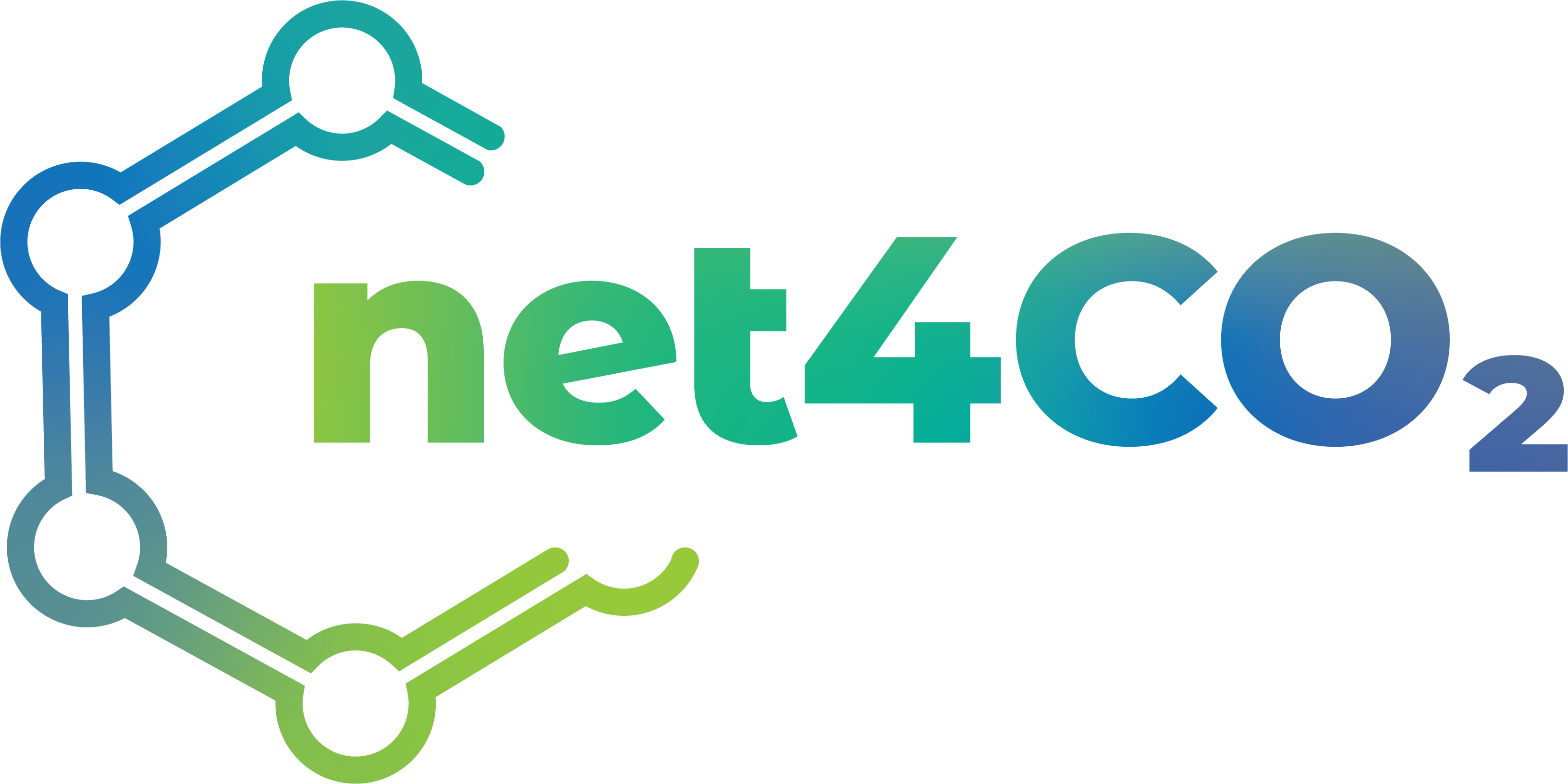About NET4CO2 CoLAB
Technical Areas
Our strategy assures a holistic approach to decarbonization through Carbon Capture, Utilization and Storage (CCUS)
Carbon Capture, Utilization and Storage (CCUS)

Targets for achieving Carbon Neutrality by 2050 will necessitate a substantial restructuring of current processes and businesses and will require the implementation of innovative solutions and technologies. The pressure for this change is increasing with the establishment of regulatory frameworks and the emergence of several incentives. These factors are injecting fresh momentum into the adoption of solutions, which is essential to limit the temperature increase to 1.5°C above pre-industrial levels.
As identified by the International Energy Agency, Carbon Capture, Utilisation, and Storage (CCUS) are key technologies for achieving Net Zero Emissions by 2050. CCUS contributes to both CO2 reductions and removals, each of which has different technical and regulatory treatments. CCUS serves as a CO2 reduction solution when applied in hard-to-abate industries (cement, chemicals, and steel), power plant retrofits, and low-carbon hydrogen production. CCUS can effectively contribute to carbon removal when applied to biomass conversion processes (BECCUS) or direct air capture (DAC).
Drawing upon industry-based experience, NET4CO2 provides expertise in CCUS and BECCUS, playing a significant role in both CO2 reduction and removal endeavors.
CO2 Capture & Transport
Carbon Capture refers to technologies that capture the greenhouse gas carbon dioxide (CO2). By preventing the release of CO2 into the atmosphere, these technologies play a vital role in mitigating climate change. Carbon capture encompasses two approaches: point-source capture, which involves capturing CO2 from large emission sources, such as industrial sources, and direct air capture (DAC), which involves extracting CO2 directly from the atmosphere. This can be done by employing several different well-established and effective methods.
Industrial processes such as energy, cement, steel, pulp and paper, chemicals, and natural gas processing are significant emitters of CO2. Together, these industries account for approximately 25% of global CO2 emissions related to energy consumption. Implementing carbon capture technologies within these sectors can result in significant reductions in global CO2 emissions. In some industrial processes, CO2 emissions are not solely the outcome of burning fossil fuels, but rather a by-product of the production processes themselves. In such cases (such as cement manufacturing and blast furnace steel making), carbon capture becomes a critical and necessary technological option to achieve substantial emissions reductions.
The goal of the CO2 Capture & Transport Team at NET4CO2 is to develop and evaluate an extensive array of technologies related to the capture and transportation of CO2, including both proprietary and non-proprietary methods, ensuring a thorough evaluation of risks and opportunities associated with these advancements.
NET4CO2 is actively involved in the advancement of several initiatives related to carbon capture and transportation processes:
Carbon Capture Technologies
Explore diverse capture technologies, including our exclusive hydrate-based process, enhanced solvents, cyclic adsorption, membranes, and other alternatives.
CO2 Transport
Assess risks and opportunities for CO2 transportation, including evaluation of the advantage of streamlined existing infrastructures, or development of cutting-edge novel infrastructures.
Water Treatment
Engage in the development of water treatment and desalination technologies, including the utilization of our proprietary hydrate-based process.
Prototype Development
Design, development, and rigorously testing of custom-made prototypes, fueled by the NetMIX technology. Provide seamless assessments of both internal and external technologies.
CO2 Utilization
Numerous approaches and achievements have resulted from the great effort of the scientific community to reduce emissions. Although the paradigm is starting to move, the main problem is strongly linked to the market change that is required a compromise between Industry and Society. One of the key solutions is to use CO2 in alternative processes that allow its mitigation and recirculation. The most promising technological developments are in the areas of synthetic fuels, biofuels, and syngas which, if massively applied, will have a significant impact on the reduction of current emissions. Other applications relate to CO2 incorporation in composite materials, cement aggregates, water treatment, agriculture, and the food industry.
Envisaging these applications, we are strongly committed to finding new approaches for CO2 utilization which can be easily implemented and scaled up to industrial levels.
From the Process Intensification point of view, processes integration will also play an important role in the reduction of CO2 footprint by minimizing the energy and OPEX requirements of conventional processes through compact plants.
The main goal of the CO2 Utilization team at NET4CO2 is to develop and evaluate an extensive array of technologies related to the utilization of CO2, including both proprietary and non-proprietary methods, towards CO2 emissions mitigation. For that, two different routes are explored through chemical transformations into useful compounds (CO2 conversion) and their direct use for strategic applications.
NET4CO2 is actively involved in the advancement of several initiatives related to carbon utilization processes:
Synthetic fuels
Study strategies to improve the production process of synthetic liquid and gas fuels to comply with the needs of industry and regulation, and develop technological processes for the production of methanol from CO2.
Biofuels
Develop technological processes for the production of sustainable aviation and maritime fuels from bio-oils.
Syngas
Promote the research on syngas production via reverse water gas shift and co-electrolysis.
Other CO2 applications
Leverage new solutions for direct CO2 utilization in recycled materials, composites, water treatment/
management, and other strategic applications.
Geostorage
The underground storage of CO2 is gaining momentum as a viable option to reduce greenhouse gas emissions. However, we currently only account for 0.5% of the required storage volumes. Therefore, it is mandatory to significantly develop and increase the Geostorage projects portfolio in each country.
CO2 is injected underground and stored in porous rocks, through four trapping mechanisms: structural/ stratigraphic, residual, dissolution, and mineral trapping.
The Geological storage of CO2 draws a substantial parallel to the Oil & Gas industry, where rock formations that have successfully trapped these fluids for hundreds of millions of years are studied in detail to ensure the safety of operations. Complex, multiscale studies ranging from regional 3D seismic surveys to 1” core flooding experiments, through to thin section microscopic studies, culminating in computational flow simulations, are performed to both ensure the safety of CO2 storage sites and well as quantify the potential storage volumes.
The main goal of the Geostorage team is to appraise and quantify the potential for underground sequestration of CO2 on the Portuguese onshore and continental shelf, by developing fully integrated studies from subsurface to surface.
Net4CO2 proposes to push this scope further, and systematically assess the potential of the Portuguese sedimentary basins to store CO2. It can be summarized in the following steps:
International Geostorage Assessment
Assess international CO2 storage options and their techno-economic limitations and risks.
Technology Development
Development of innovative workflows and integrated geotechnical studies to assess geological CO2 storage sites.
Geostorage Portfolio
Build a systematic and comprehensive portfolio of safe underground sites for geological CO2 storage in Portugal.
Support to regulators
Support governmental institutions with technical leadership in decision-making processes and policies regarding the geological storage of CO2.



Business Development
The deployment of CCUS projects has been slow because of the lack of dedicated regional strategies and financial support to solve the “egg and chicken” problem – companies are only willing to invest in capture technologies if the access to dedicated infrastructure to transport and store CO2 or use as feedstock is secured; infrastructure has not been developing fast enough due to high up-front costs and the requirement to identify CO2 sources.
This problem, however, will have to be surpassed in the short term, as the European Green Deal Industrial Plan, set in 2023, is targeting an operating annual storage capacity of 50 Mtonnes of CO2 by 2030, one order of magnitude above the storage capacity of the planned CCUS projects. CCUS projects require effective synergies between different emitters which could share the same infrastructure and also between players across the whole CCUS value chain.
A well-informed decarbonization investment involves a thorough analysis of the triangle of technologies/policies/incentives, with holistic assessments of technical, economical, and environmental dimensions, and stimulating partnerships and hubs, particularly in the CCUS field.
The goal of the Business Development team at NET4CO2 is to provide technical support and science-based advice for:
1) industrial players, helping them find the most feasible decarbonization solutions considering market synergies and funding opportunities, 2) policy-makers to guarantee the alignment of the regional strategies with the promotion of a sustainable CO2 economy, 3) R&D developers, helping to tune their innovative technologies to the market needs in the CCUS field.
NET4CO2 is actively involved in several initiatives for business development in the decarbonization area
Technological surveillance
Technological surveillance and scrutiny of technologies and trends in the NetZero field, using engineering best practices, process simulation, techno-economic and environmental/
life-cycle assessments.
Support to regulators
Maintenance of an updated database of the regulatory framework and financing tools for NetZero transition, and develop global outlook reports.
Industry consulting
Development of integrated decarbonization solutions for industrial players, including screening and development of technological options, with techno-economic and environmental assessments.
Market research
Establishment of national and international synergies and partnerships by scouting potential players, their strategies and ambitions, and contacting key stakeholders such as regional project leaders and
policy-makers and actively provide feedback in regulatory/
policy forums.










